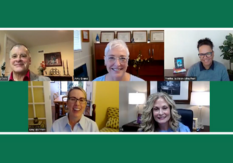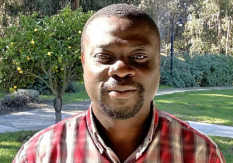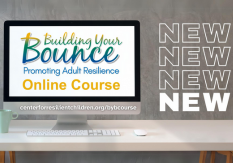|
|
Watch these video series on the power of empathy, overcoming toxic positivity
“Practicing empathy is not always easy, but it is a critical skill that can help you build stronger relationships, manage your emotions and foster greater compassion.”
– Devereux Center for Resilient Children Director Susan Damico
Empathy is defined as your ability to do your best to understand what a person is feeling, and why they might be feeling that way. While it is not something you are born with, Damico says everyone has the capacity to cultivate greater empathy and enhance their resilience.
“Empathy is important in nearly every aspect of daily life, and has to be taught, modeled and learned,” Damico noted. “With all of the stressors in the world right now, we often may find ourselves jumping to conclusions or being quick to judge. Instead, try putting yourself in someone else’s shoes. Gain a better understanding of their perspective and take the time to nurture your empathy.”
Building resilience through empathy
The Devereux Center for Resilient Children (DCRC) offers a series of free videos on the power of empathy. Look below for details about each episode.
- Defining empathy: In this first episode, DCRC Early Childhood Specialist and National Trainer Nefertiti B. Poyner, Ed.D., helps you embark on your journey toward increased empathy.
- Why we need empathy: Poyner suggests practicing empathy can result in improved social connections, greater self-regulation and a sense of altruism. She notes, “Getting out there and modeling an empathetic skillset can bring about a helping nature in others.”
- How we “do” empathy: This episode offers tips on practicing empathy. Poyner says, “Work on listening without interrupting, try your best to understand people and get curious.”
- The ABCs of empathy: Poyner discusses barriers to empathy, noting, “Sometimes we experience barriers because we forget our ABCs: acknowledging humanity, bypassing our feelings and connecting beliefs.”
- One thing to remember about empathy: In this episode, Poyner offers one final tip for being more empathetic toward others.
Tackling toxic positivity
While empathy is the ability to recognize, and respond appropriately to, another person’s feelings, toxic positivity involves dismissing someone’s negative emotions and responding with false reassurances, such as, “everything will be OK” or “it’s for the best.”
To help adults learn how to avoid toxic positivity, the DCRC team offers a series of free videos that dig deeper into this term.
- Defining it: In this first episode, Poyner explains what toxic positivity means and how it is becoming more prominent.
- Optimism vs. toxic positivity: Poyner discusses how toxic positivity differs from optimism. She says, “A person who chooses optimism readily understands both the good and the bad of a situation.”
- Break through confusion: This episode focuses on clearing up any confusion when comparing optimism and hope with toxic positivity. Poyner notes, “Hope and optimism are contributing factors to an individual’s resilience. If we confuse that with toxically positive behavior, then we’re missing an opportunity to have that person be better.”
- Taking out the “toxic:” Poyner offers three ideas to help take the “toxic” out of toxic positivity.
- Honor ALL of who you are: In the final episode, Poyner offers guidance on how to avoid toxic positivity, noting, “Toxic positive behavior happens when you do not pay attention to the hard stuff.”
“Remember, it’s OK to not always be OK,” explained Damico. “You need to know when to take off those rose-colored glasses and acknowledge your true feelings and the feelings of others.”
Learn more about the Devereux Center for Resilient Children, and learn more about Devereux Advanced Behavioral Health.
Latest News
 |
|
Devereux video: President and CEO Carl E. Clark II chats with executive directors
Watch our latest Fireside Chat, in which Devereux President and CEO Carl E. Clark II connects with three Executive Directors – Amy Evans (CA), Yvette Jackson (AZ) and Pam Reed (TX). In this video, you’ll learn more about these leaders (including their first job at Devereux!) and those initiatives that make them proud to work here – and stay here.
|
 |
|
Celebrating Devereux’s Healthcare Heroes: Spotlight on Devereux California Program Manager James Abrokwah
At Devereux, our employees are at the heart of everything we do – and are key to our success. Learn how Devereux California Program Manager James Abrokwah is serving and inspiring others every day.
|
 |
|
Devereux Center for Resilient Children launches ‘Building Your Bounce’ online adult resilience course
The Devereux Center for Resilient Children has launched a new online learning course, titled “Building Your Bounce: Promoting Adult Resilience.” This self-paced course is designed to help teachers and other child-serving professionals who educate, and care for, young children (birth through preschool) discover ways to nurture their resilience and manage stress more effectively.
|
 |
|
Autism Spectrum News features Devereux article on how to support families with autism
An article written by Devereux National Director of Family Engagement Amy Kelly, MBA, MNM, was recently featured in Autism Spectrum News. In the article – “Awareness and acceptance: 10 things I wish everyone understood about autism” – Kelly reflects on her family’s experiences over the past 20 years since her daughter, Annie, was diagnosed with autism. She also shares a few things she wishes everyone knew about autism and how to offer support.
|
More Stories
|














